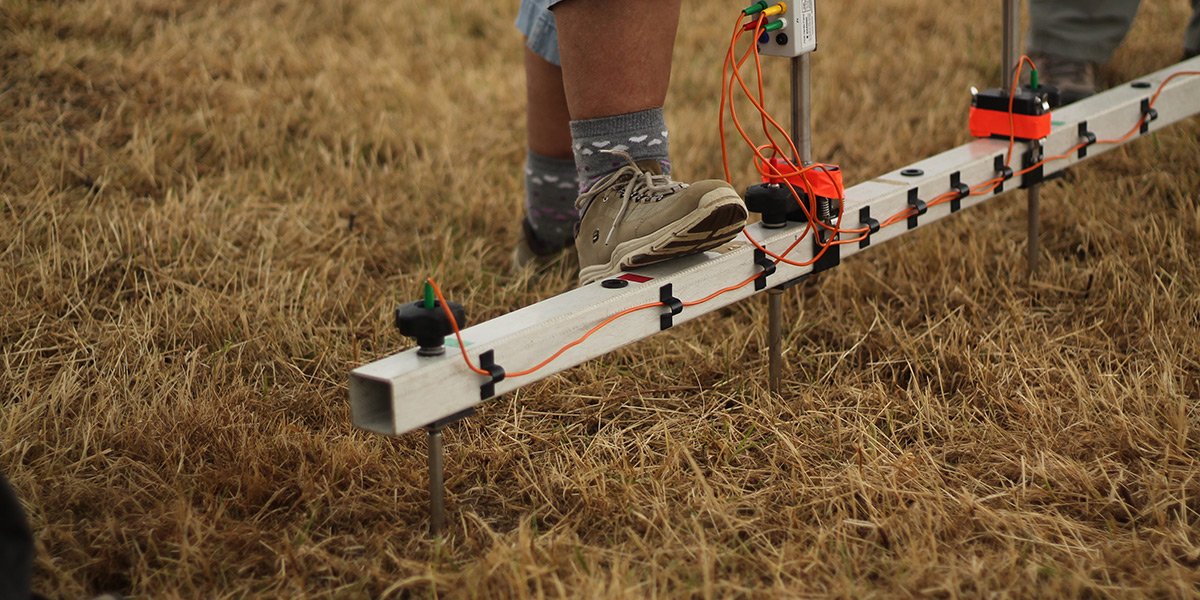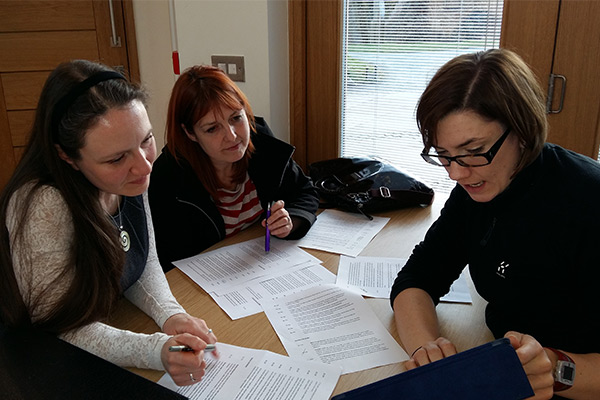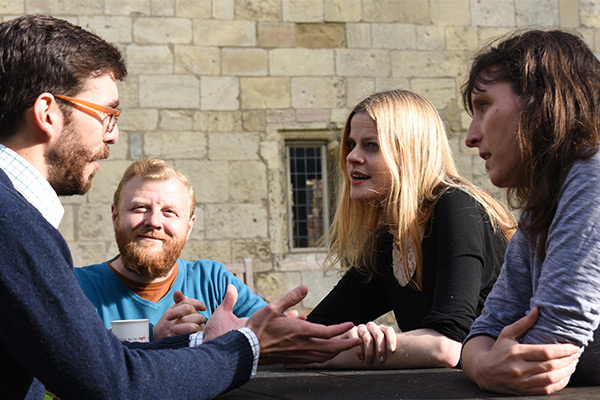
Train to be part of the next generation of archaeological pioneers
Year of entry: 2025 (September)
1 year full-time,
2 years part-time,
3 years part-time
September 2025 (semester dates)
Join us online or in person to find out more about postgraduate study at York.
Find out moreQS World University Rankings by Subject, 2025
QS World University Rankings by Subject, 2025
Establish wide-ranging, advanced practical skills, while gaining a deep theoretical knowledge and understanding of the logistical challenges, legal requirements, values and ethics involved in archaeological fieldwork.
Devised to meet demand for professional training both within the UK and internationally, this challenging and rewarding course offers you the perfect blend of theory and practice. It will give you a thorough knowledge of the history and development of archaeological fieldwork and the current state of the art, acquainting you with the key methods employed in modern fieldwork, analysis and dissemination. You'll learn to think strategically about project design and tactically about project implementation.
Under the supervision of our experienced and well-connected staff and situated within a community of practitioners that is unrivalled in the UK, you'll build a deeper understanding of the values, theories, legislation and ethics which underpin modern fields of practice in archaeology. You will explore how they impact upon our fieldwork methodologies and will be able to supplement this knowledge with a range of practical modules and placement opportunities with professional archaeological organisations, to further develop the skills and knowledge essential for varied archaeological careers.
 The Field Archaeology course has equipped me with the sensibility of both archaeological practices and theories, which serves as a solid grounding for my current duties of interpreting and curating archaeological data and disseminating archaeological knowledge for greater utility by the public.Brevis, MA Field Archaeology
The Field Archaeology course has equipped me with the sensibility of both archaeological practices and theories, which serves as a solid grounding for my current duties of interpreting and curating archaeological data and disseminating archaeological knowledge for greater utility by the public.Brevis, MA Field ArchaeologyExhibition Curator, Hong Kong Museum of History
York is the UK's archaeological capital and we use it extensively as our ‘living lab’ for both teaching and research.
Informality is one of our distinctive qualities - the atmosphere in our department is friendly, supportive and enthusiastic. We want you to develop your potential and thrive at York.
Ranked 6th overall for our research according to the Times Higher Education’s ranking of the latest REF results (2021).
You will study 180 credits over the duration of your course:
Core modules
Option modules
You will choose five option modules from examples including:
You'll also have the opportunity to choose options from our full module catalogue. Some option modules combinations may not be possible. The option available to you will be confirmed after you begin your course.
Our modules may change to reflect the latest academic thinking and expertise of our staff, and in line with Department/School academic planning.
Every course at York is built on a distinctive set of learning outcomes. These will give you a clear understanding of what you will be able to accomplish at the end of the course and help you explain what you can offer employers. Our academics identify the knowledge, skills, and experiences you'll need upon graduation and then design the course to get you there.
| Study mode | UK (home) | International and EU |
|---|---|---|
| Full-time (1 year) | £11,200 | £25,900 |
| Part-time (2 years) This is the year 1 fee. Fees for future years are subject to confirmation. |
£5,600 | £12,950 |
| Part-time (3 years) This is the year 1 fee. Fees for future years are subject to confirmation. |
£3,733 | £8,633 |
Students on a Student Visa are not currently permitted to study part-time at York.
For courses which are longer than one year, the tuition fees quoted are for the first year of study.
UK (home) or international fees? The level of fee that you will be asked to pay depends on whether you're classed as a UK (home) or international student. Check your fee status.
Find out more information about tuition fees and how to pay them.
We don't anticipate there being any additional fees associated with this course. All books and resources you need will be available in the library or online and it isn't mandatory that you buy your own copies. You may wish to set aside a small budget for photocopying, depending on how you like to work.
Some modules include field trips. Costs associated with attending field trips are covered by the department.
Placements are unpaid and there may be travel costs associated with attending them. However, if this is an issue, other placements can be considered which do not have travel costs associated.
Discover your funding options to help with tuition fees and living costs.
We'll confirm more funding opportunities for students joining us in 2025/26 throughout the year.
If you've successfully completed an undergraduate degree at York you could be eligible for a 10% Masters fee discount.
We are pleased to work with Chevening Scholars to offer funding for our Masters programmes. Chevening Scholarships provide one year of fully-funded postgraduate study in the UK for international (including EU) students. The scholarships are open to early and mid-career professionals who have the potential to become future leaders.
We have a variety of funding options available within the department.
You can use our living costs guide to help plan your budget. It covers additional costs that are not included in your tuition fee such as expenses for accommodation and study materials.
You’ll work with world‐leading academics who’ll challenge you to think independently and excel in all that you do. Our approach to teaching will provide you with the knowledge, opportunities, and support you need to grow and succeed in a global workplace.
You will be taught via a combination of lectures, seminars, workshops and field visits.
You will be based on Campus West and in King's Manor.
Our beautiful green campus offers a student-friendly setting in which to live and study, within easy reach of the action in the city centre. It's easy to get around campus - everything is within walking or pedalling distance, or you can always use the fast and frequent bus service.
You will be assessed by a variety of methods. Depending on which modules you opt to take, these could include:


Our graduates have gone on to pursue research degrees or take up managerial positions working for museum, conservation and archaeological services and for local councils, national authorities, field units and heritage bodies. Other graduates have set up their own archaeological businesses, both within the UK and in other countries. You'll also develop transferable skills that are applicable to a multitude of careers beyond archaeology and heritage.
| Typical offer | |
|---|---|
| Undergraduate degree | 2:2 or equivalent in Archaeology or a relevant subject. |
| Other qualifications and experience | Mature students or those with less conventional qualifications but with relevant professional experience in this field will be considered. Candidates lacking sufficient previous experience will be required to spend at least three weeks prior to entry on either one of the department’s own training excavations or another approved project. To find out if your experience or qualifications are appropriate, please contact the Course Director. We normally interview applicants before making an offer. |
| Other international qualifications | Equivalent qualifications from your country |
You will need to submit examples of written work with your application. Please see our guidance on submitting written work.
If English isn't your first language you may need to provide evidence of your English language ability. We accept the following qualifications:
| Minimum requirement | |
|---|---|
| IELTS (Academic and Indicator) | 6.5, minimum 6.0 in each component |
| Cambridge CEFR | B2 First: 176, with 169 in each component |
| Oxford ELLT | 7, minimum of 6 in each component |
| Oxford Test of English Advanced | 136, minimum 126 in each component |
| Duolingo | 120, minimum 105 in all other components |
| LanguageCert SELT | B2 with 33/50 in each component |
| LanguageCert Academic | 70 with a minimum of 65 in each component |
| Kaplan Test of English Language | 478-509, with 444-477 in all other components |
| Skills for English | B2: Merit overall, with Pass with Merit in each component |
| PTE Academic | 61, minimum 55 in each component |
| TOEFL | 87, minimum of 21 in each component |
| Trinity ISE III | Merit in all requirements |
For more information see our postgraduate English language requirements.
You may be eligible for one of our pre-sessional English language courses. These courses will provide you with the level of English needed to meet the conditions of your offer.
The length of course you need to take depends on your current English language test scores and how much you need to improve to reach our English language requirements.
After you've accepted your offer to study at York, we'll confirm which pre-sessional course you should apply to via You@York.

We offer a range of campus accommodation to suit you and your budget, from economy to premium.

Explore campus and city life and hear what our current students have to say about living here.

Lively, full of culture and beautiful, York is regularly voted one of the best places to live and visit in the UK.

Find out more about York. Chat to staff and students and take the tour, on campus or online.